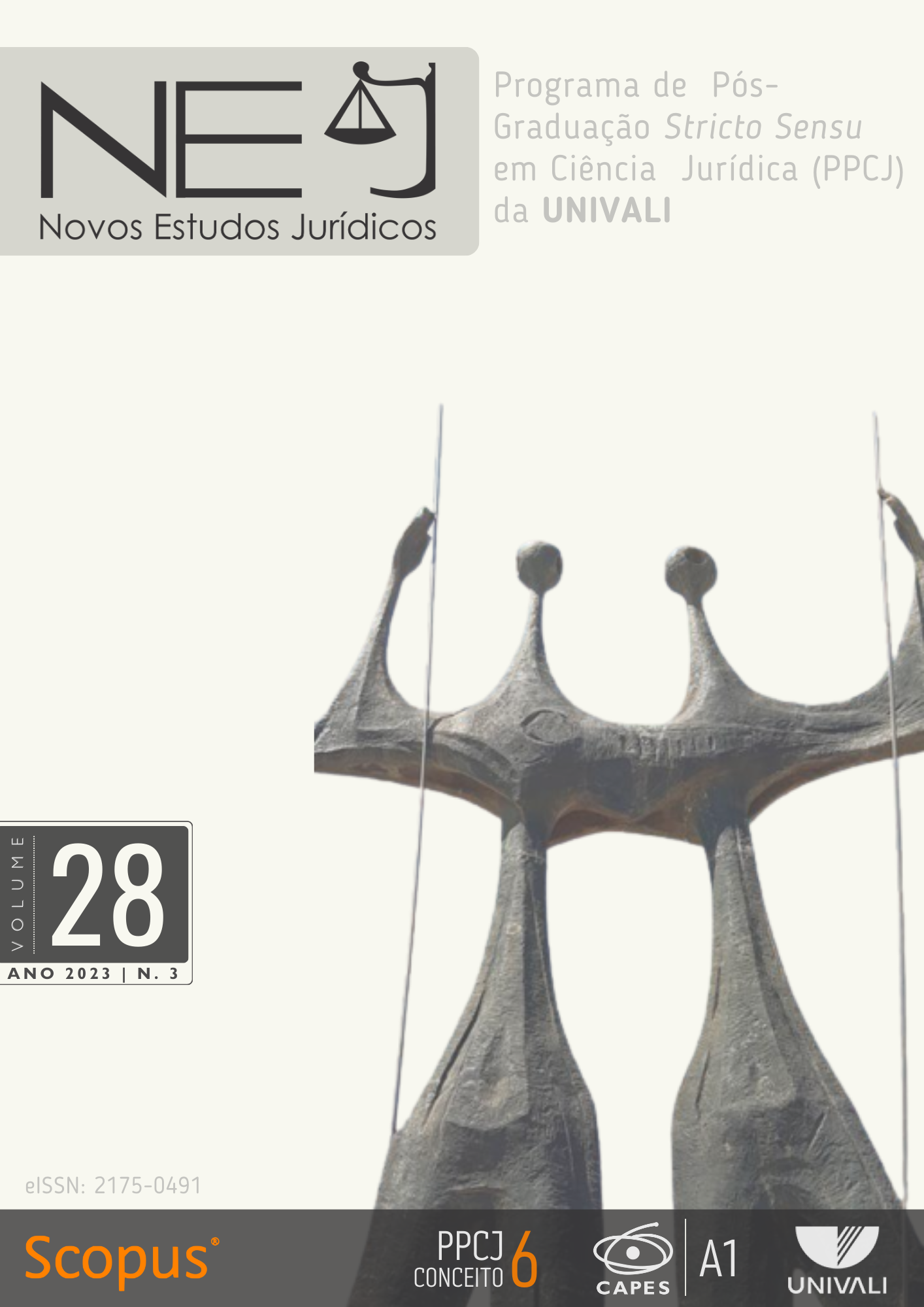ARTIFICIAL INTELLIGENCE IN JUDICIAL DECISIONS: OPACITY VERSUS PROCEDURAL GUARANTEES
DOI:
https://doi.org/10.14210/nej.v28n3.p516-535Keywords:
Artificial Intelligence, Constitutional Guarantees, OpacityAbstract
Contextualization: The text proposes, as its theme, a critical analysis of the use of artificial intelligence in the judicial decision-making process.
Objective: The article aims to examine how the use of new technologies impacts the realization of a process with guarantees.
Method: For the development of the work, the dialectical method was used, correlating the bibliography on the topic, in order to understand how the use of artificial intelligence can be beneficial or detrimental to constitutional guarantees in this field. It also investigates the issues faced when using algorithmic logic to support decisions on human matters, such as the opacity of the systems and the possibility or lack thereof to effectively question the reasons behind machine-made decisions. Finally, the need for regulation and standardization to guide the technological process in reaffirming the procedural guarantees that have been achieved is discussed.
Results: It was concluded that unless artificial intelligence programs achieve a high degree of transparency and explainability, it will not be possible to use them to support or make judicial decisions.
Downloads
References
ANGWIN, Julia; MATTU, Surya; KIRCHNER, Lauren. Machine Bias. Disponível em https://www.propublica.org/article/machine-bias-risk-assessments-in-criminal-sentencing. Acesso em: 21 ago. 2023. DOI: https://doi.org/10.1201/9781003278290-37
BBC NEWS BRASIL. Sistema de algoritmo que determina pena de condenados cria polêmica nos EUA. 2023. Disponível em: <https://www.bbc.com/portuguese/brasil-37677421>. Acesso em: 06 mar. 2023.
BOLDT, Raphael. Criminologia midiática: Do discurso punitivo à corrosão simbólica do garantismo. Curitiba: Juruá, 2013.
BOLZAN DE MORAIS, José Luis; LOBO, Edilene. A democracia corrompida pela surveillance ou uma fake democracy distópica. In: BOLZAN DE MORAIS, José Luís (Org.). A democracia sequestrada. São Paulo: Tirant Lo Blanch, 2019. p. 27-42.
BOLZAN DE MORAIS, José Luis; BARROS, Flaviane de Magalhães. Compartilhamento de dados e devido processo: como o uso da inteligência artificial pode implicar em uma verdade aleteica. In: NUNES, Dierle; LUCON, Paulo Henrique dos Santos; WOLKART, Erik Navarro (Org.). Inteligência artificial e direito processual. Salvador: JusPodivm, 2022. p. 341-365.
BRASIL, Conselho Nacional de Justiça. Resolução nº 332 de 21 de agosto de 2020. Dispõe sobre a ética, a transparência e a governança na produção e no uso de inteligência Artificial no Poder Judiciário e dá outras providências. 2020. Disponível em: <https://atos.cnj.jus.br/atos/detalhar/3429>. Acesso em: 28 jun. 2023.
BUCCI, Eugenio. Incerteza, um ensaio: Como pensamos a ideia que no desorienta (e orienta o mundo digital). Belo Horizonte: Autêntica. 2023.
CONFESSORE, Nicholas. Cambridge Analytica. 2023. Disponível em: <https://www.nytimes.com/2018/04/04/us/politics/cambridge-analytica-scandal-fallout.html>. Acesso em: 28 jun. 2023.
CUEVA, Ricardo Villas Bôas. Inteligência artificial no judiciário. In: NUNES, Dierle; LUCON, Paulo Henrique dos Santos; WOLKART, Erik Navarro (Org.). Inteligência artificial e direito processual. Salvador: JusPodivm, 2022. p. 55-67.
DOMINGOS, Pedro. O Algoritmo Mestre: Como a busca de algoritmo de machine learning definitivo recriará nosso mundo. São Paulo: Novatec. 2017.
FERRAJOLI, Luigi. Direito e razão: Teoria do garantismo penal. São Paulo: Editora Revista dos Tribunais, 2002.
FERRARI, Isabela; BECKER, Daniel. Direito à explicação e decisões automatizadas: reflexões sobre o princípio do contraditório. In: NUNES, Dierle; LUCON, Paulo Henrique dos Santos; WOLKART, Erik Navarro (Org.). Inteligência artificial e direito processual. Salvador: JusPodivm, 2022. p. 275-301.
FISHER, Max. A máquina do caos: como as redes sociais reprogramaram nossa mente e nosso mundo. 1a Ed. São Paulo: Todavia, 2023.
GOGONI, Ronaldo. AlphaGo se aposenta no auge; Google vai usar o que aprendeu com IA em outras áreas. 2023. Disponível em: <https://meiobit.com/arquivo/366330/google-alphago-ia-heuristica-derrota-numero-um-de-go-do-mundo-e-se-aposenta-deepmind-vai-utilizar-o-que-aprendeu-em-outros-sistemas-especialistas/>. Acesso em: 06 mar. 2023.
LASSALE, José Maria. Ciberleviatán: El colapso de la democracia liberal frente a revolución digital. Barcelona: Arpa, 2019.
NETO, Elias Jacob de Menezes; BOLZAN DE MORAIS, José Luis. Análises computacionais preditivas como um novo biopoder: modificações do tempo na sociedade dos sensores. Revista Novos Estudos Jurídicos – Eletrônica, v. 24, n. 3, p. 11xx-11xx, set-dez 2018. Disponível em: <https://siaiap32.univali.br/seer/indez.php/nej/article/view/13769/7808>. Acesso em: 9 fev. 2023.
NUNES, Antônio José Avelãs. Estado capitalista e suas máscaras. 3ª Ed. São Paulo: Lumen Juris, 2021.
NUNES, Dierle. Virada Tecnológica no direito processual e etapas do emprego da tecnologia no direito processual: seria possível adaptar o procedimento pela tecnologia. In: NUNES, Dierle; LUCON, Paulo Henrique dos Santos; WOLKART, Erik Navarro (Org.). Inteligência artificial e direito processual. Salvador: JusPodivm, 2022. p. 17-54.
PASQUALE, Frank. The Black Box Society. Cambridge: Harvard University Press, 2015. DOI: https://doi.org/10.4159/harvard.9780674736061
PIMENTEL, Alexandre F.; BOLZAN DE MORAIS, José Luis; SALDANHA, Paloma Mendes. Estado de Direito e Tecnopoder. Justiça do Direito, v. 35, n. 3, Set./Dez. 2021, pp. 06-43. DOI: https://doi.org/10.5335/rjd.v35i3.13241
SADIN, Eric. La inteligência artificial o el desafio del siglo: Anatomia de um antihumanismo radical. 1ª ed. Buenos Aires: Caja Negra, 2020.
SÁNCHEZ-ARJONA, Mercedes Loorente. Inteligencia Artificial, valoración del riesgo y derecho al debido processo. In: LÓPEZ, Sonia Calaza; SÁNCHEZ-ARJONA, Mercedes Llorente (org.). Inteligencia artificial legal y administración de justicia. Navarra: Thompson Reuters Aranzadi, 2022, p. 371-396.
SHANNON, Claude E.; WEAVER, Warren. The mathematical theory of communication. Chicago: University of Illinois Press. 1963. E-book.
TAVARES, Juarez; CASARA, Rubens. Prova e Verdade. São Paulo. Tirant lo Blanch, 2020.
TIME. Exclusive: OpenAI Used Kenyan Workers on Less Than $2 Per Hour to Make ChatGPT Less Toxic. 2023. Disponível em: <https://time.com/6247678/openai-chatgpt-kenya-workers/>. Acesso em: 06 mar. 2023.
UOL NOTÍCIAS. Juiz usa ChatGPT para proferir decisão em julgamento na Colômbia. 2023. Disponível em: <https://noticias.uol.com.br/ultimas-noticias/deutschewelle/2023/02/03/juiz-usa-chatgpt-para-proferir-decisao-em-julgamento-na-colombia.htm>. Acesso em: 06 mar. 2023.
WIENER, Norbert. Cibernética e sociedade: o uso humano dos seres humanos. São Paulo: Cultrix, 1954.
ZUBOFF, Shoshana. A era do capitalismo de vigilância: A luta por um futuro humano na nova fronteira de poder. São Paulo: Intrínseca, 2019.
Downloads
Published
How to Cite
Issue
Section
License
Na qualidade de autor(es) da colaboração, original e inédita, sobre o qual me(nos) responsabilizo(amos) civil e penalmente pelo seu conteúdo, após ter lido as diretrizes para autores, concordado(amos) plenamente com as Políticas Editorias da Revista Novos Estudos Jurídicos - NEJ e autorizo(amos) a publicação na rede mundial de computadores (Internet), permitindo, também, que sua linguagem possa ser reformulada, caso seja necessário, sem que me(nos) seja devido qualquer pagamento a título de direitos autorais, podendo qualquer interessado acessá-lo e/ou reproduzi-lo mediante download, desde que a reprodução e/ou publicação obedeçam as normas da ABNT e tenham a finalidade exclusiva de uso por quem a consulta a título de divulgação da produção acadêmico científico.





























